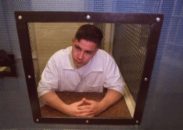
As I was living in the UK in the 1990’s I had never heard of the case of Paul Broussard a 27 year old gay man in Houston Texas who was the fatal victim of a hate crime in the early hours of July 4th 1991, until I came across this excellent intriguing new documentary. Made by Canadian filmmaker Alison Armstrong, it very calmly relates what happened as a result of the murder that night in a story that seems to only very recently have moved to any sort of closure.
Because of the authorities reluctance to investigate the circumstances of Broussard’s death at the time it would have probably just remained as simply another unsolved crime statistics in police records had it not been for gay activist Roy Hill. He immediately mobilized the local LGBT community into relentless public protests and he bombarded the media in such an effective way that ensured the case was never ever forgotten. The police were forced to act and they made a series of arrests of a group of teenagers from one of the more affluent suburbs which gained notoriety as the boys were named after it when the media dubbed them the Woodlands 10.
They all entered into a series of plea bargaining for their individual roles in the fracas that happened that night, and most of them were put on probation. However Jon Buice, the 17 year old charged with actually stabbing Broussard twice, ended up being advised by his lawyers to accept the best deal they could broker, which was a jail sentence of 45 years.
Years later Hill started to have second thoughts about how he had somewhat cornered the authorities into being seen to be tough, and in their haste to plea bargain they had been not one single trial and no real examination of the facts of actually what when down that night. He began to think that as he was responsible for this constant pressuring to ‘get a result’, then it was his fault that they over reacted in giving Buice such an unheard of long sentence. So he decided to start communicating with Buice in jail, and through a series of letters, he got to know the young man quite well. In time he even started to fight as hard for his parole as he did to have him jailed in the first place.
Armstrong presents the evidence in a very matter-of-fact way as Hill uncovers it : Buice’s exemplary good behavior record in jail, the three College degrees he has earned, and the other evidence that he discovers about that night almost 30 years ago. Not only were the First Responders very slow to arrive on the scene when a stabbed Broussard was still conscious, but there was a reluctance to help any injured gay man at that time because of the general paranoia about the whole AIDS epidemic In fact a new autopsy would clearly show that if Broussard had got to hospital in time, he would still be alive.
As much as Hill tried to help Buice get released through Texas’s very secretive Parole Board, there were other LGBT anti-violence activists lead by Andy Kaplan and supported by Broussard’s mother, who constantly petitioned to stop Buice being freed. By presenting some very questionable evidence such as a totally unsupported claim that Buice was having an affair with a female Prison Chaplain, they managed to delay his release for several years before he was finally allowed up in 2014.
The documentary strives to clearly be as bi-partisan as possible, but the fact that it is so sympathetic to Hill’s commitment to secure Buice’s release as he believes he has served sufficient time for the crime, that it is almost impossible not be swayed. Kaplan on the other hand, does his best to make a case that Buice is faking his remorse and is not the model prisoner he would have us believe, but in the end of the day he fails to convince either the authorities or us.
No matter how despicable any form of hate crimes are, If nothing else this totally compelling film proves that in this particular case destroying the life of one young man cannot bring back another.

